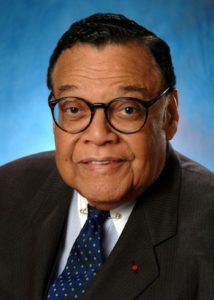
William T. Coleman Jr.
*William T. Coleman Jr. was born on this date in 1920. He was a Black lawyer, political cabinet member, and administrator.
From the Germantown section of Philadelphia, he was the second of three children of William Thaddeus Coleman Sr., the director of a Boys Club for 40 years, and Laura Mason, his former teacher, who had also taught German. His family came from six generations of teachers and Episcopal ministers on his mother’s side, who operated the Underground Railroad in St. Louis, as well as many social workers on his father’s side. W.E.B. DuBois and the poet Langston Hughes would have dinner at his home.
Coleman attended a segregated elementary school and was one of just seven Black students at Germantown High School, one of Philadelphia’s best. He was suspended twice at the school for defending his Blackness with a racist comment from one of his teachers, and another came from the administration when he demanded to join the school’s all-white swim team. After the suspension was lifted, he said, the team disbanded rather than admit him, and it regrouped after he graduated.
Coleman went on to the University of Pennsylvania (with a strong recommendation from the swim team coach, he said) and graduated summa cum laude with a double major in political science and economics in 1941. He was accepted into Harvard Law School but left in 1943 to enlist in the Army Air Forces. He trained in Mississippi with the Tuskegee Airmen, though he failed to become a fighter pilot.
He spent part of his service as a defense team member in court-martial proceedings and, in one case, helped defend Black airmen who had been arrested for challenging segregation at an officers’ club. While on leave from the Army in 1945, he married Lovida Mae Hardin, a New Orleans native he had met when she was studying for a degree in education at Boston University. The Harvard Law Review accepted Coleman, who returned to the law school after military service ended, as one of its first Black staff members and graduated first in his class in 1946.
After law school, Coleman served as a law secretary to a federal appeals court judge in Philadelphia. He then broke new ground. As The New York Times reported in April 1948, “For the first time in the Supreme Court’s 158-year history, one of its justices will have a Negro law clerk.” The justice was Felix Frankfurter; the clerk was Mr. Coleman. (He quickly learned how difficult it was to find a restaurant in the capital that would allow him and his fellow clerks, all-white, including Elliot Richardson, a future United States attorney general, to have lunch together.) After the clerkship, white-shoe firms in Philadelphia repeatedly rejected Coleman, who sought to go into private practice, before he was finally accepted by Paul, Weiss, Rifkind, Wharton & Garrison in New York. He later returned to Philadelphia to be a partner at Dilworth, Paxson, Kalish & Levy, a significant firm there and, at the time, an all-white one. From 1952 to 1963, he also served as Philadelphia’s special counsel on transportation issues.
By then, he was deeply involved in civil rights issues. In 1951, Thurgood Marshall, then chief counsel for the NAACP (and later the first Black justice on the Supreme Court in 1967), asked Coleman to join the legal team preparing the briefs in Brown v. Board of Education. Those arguments contributed to the court’s unanimous declaration that state laws establishing separate schools for Black and white students were unconstitutional. Coleman was named president of the NAACP Legal Defense and Educational Fund in 1971 and was its chairman from 1977 to 1997. He argued 19 cases before the Supreme Court altogether.
Coleman twice turned down offers for federal judgeships from Presidents Johnson and Nixon. He was co-chairman of the White House Conference on Civil Rights in 1966. In 1995, President Bill Clinton presented him with the Presidential Medal of Freedom. His memoir, “Counsel for the Situation,” was written with Mr. Bliss and had a foreword by Justice Stephen Breyer. In it, Coleman reflected on his life and the American legal system, paying tribute to the people who had influenced him, both Black and white, as well as Republican and Democrat. “They shared the strong conviction,” he wrote, “that individual talent, brilliance, and effort can and will change the course of history.” A lifelong Republican, Coleman was as comfortable in the boardrooms of powerful corporations, such as PepsiCo, IBM, and Chase Manhattan Bank, as he was in the halls of government. He was the second African American to serve in a White House cabinet, heading the Department of Transportation.
William T. Coleman Jr. died on March 31, 2017, at his home in Alexandria, VA. He was 96. He resided at a care facility with his wife of over 70 years, Lovida Coleman. In addition to his wife, he is survived by a daughter, Lovida H. Coleman Jr., a prominent Washington lawyer; two sons, William III, a former general counsel to the Army, and Hardin, a former dean of the School of Education at Boston University; and four grandsons.